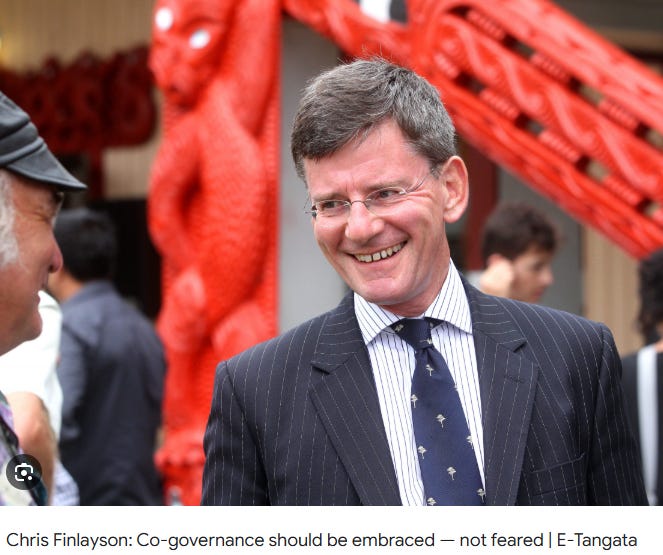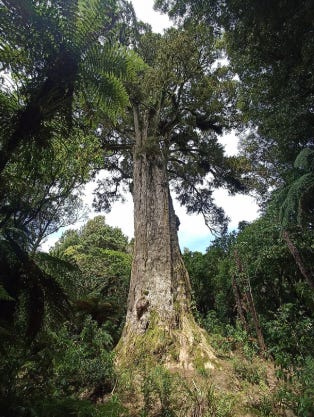On 26 June 2025, multiple Māori groups filed a High Court legal claim to all New Zealand’s natural fresh water. In the short period since then, more Māori have jumped on the water wagon. The claim’s chief protagonist is a man named Kingi Smiler. You can listen here to a chat that Smiler recently had with broadcaster Michael Laws on The Platform:
Click to view
Smiler & Co’s claim overlaps with Ngāi Tahu’s claim to the South Island’s natural fresh water. The Christchurch High Court’s hearing of Ngāi Tahu’s claim ended in April 2025. It’s not clear when the judge’s decision on Ngāi Tahu’s claim will be published. Former National Party Minister and Attorney-General Chris Finlayson is leading the legal team on Ngāi Tahu’s H2Onslaught.

Smiler says his motivations for orchestrating the claim include “standing up for the health of our water”. Which is mighty hypocritical of Smiler, given dairy farming degrades New Zealand’s freshwater lakes and waterways more than any other activity and Smiler is deeply steeped in dairy farming.
Kingi Smiler founded Miraka, a large-scale Central North Island dairy company, and is currently the chairman of Wairarapa Moana ki Pouākani Incorporation, the Māori incorporation that owns Miraka.
It’s the same brazen hypocrisy that blights Ngāi Tahu’s claim to the South Island’s fresh water, with Ngāi Tahu also feigning to be motivating by concern for water quality…all while owning and running one of the largest dairy farming conglomerates in the South Island.

I haven’t been able to track down Smiler’s Statement of Claim. But from the news coverage, his water grab seeks enforceable legal recognition of tikanga Māori proprietary rights in water and geothermal resources, together with a water allocation system that enables Māori to exercise kaitiakitanga over water. (Out of the other side of his mouth, Smiler told RNZ, “This is not about Māori trying to own the water”.)
Smiler’s surprise assay to capture New Zealand’s fresh water is about as credible a Māori claim to a Gisborne family farm, a few decades ago. That try-on claim was based solely on the family’s patriarch singing Woody Guthrie’s iconic song This Land is Your Land, at a party hosted by the family, a party that included the local Māori who claimed the farm.
Predictably, Smiler’s claim is based on alleged breaches of the Treaty of Waitangi and findings of the Waitangi Tribunal. Smiler has also fastened onto a throwaway line in a 2012 affidavit of former National Party Deputy Prime Minister Bill English. English supposedly acknowledged Māori rights and interests in freshwater and geothermal resources, something New Zealand’s separatist Supreme Court is said to have picked up on in 2013.
It’s all rather reminiscent of the life-of-its-own significance now bestowed upon Judge Robin Cooke’s “the Treaty…akin to a partnership” line in his 1987 Māori Council v Attorney-General decision.
Smiler was inducted into New Zealand’s Business Hall of Fame in 2013. Smiler’s BHoF bio states:
Kingi traces his whakapapa to ancestors who experienced first-hand the devastating effects of colonization and the loss of Māori land.
Here are a few unsolicited truths for you, Mr Smiler…
- Your ancestry traces as much to the colonisers of New Zealand as it does to the original indigenous human population. So, when it comes to colonisation, you’re as much a culprit as a “victim”.
- Without colonisation, Māori would have no dairy cows, cattle, sheep, goats, llamas, ostriches or any other domesticable animals and your beloved Mikara would have no animals to farm. Each of the six species of moa would have made excellent domesticable animals, but they are all extinct from climate change…the distinctly hostile climate (for moas) that the original Polynesian inhabitants of New Zealand brought to New Zealand’s shores.
- It would be nice and honest Mr Smiler if, just occasionally, you and your fellow Māori activists could bring yourselves to acknowledge the benefits that colonisation has brought to Niu Tirani (that’s Māori for “New Zealand”, as used in the Māori language version of Te Tiriti o Waitangi – much better, in my view, than the asinine “Aotearoa”).
In response to a 2003 Court of Appeal decision that Māori may own customary title to parts of New Zealand’s foreshore and seabed, then Prime Minister Helen Clark’s Labour Government passed the Foreshore and Seabed Act 2004. That legislation extinguished Māori customary title to foreshore and seabed and declared those areas to be public domain, owned by the Crown for all New Zealanders.

In 2011, the National Party-led Government - with John Key as Prime Minister, Bill English as Deputy Prime Minister & Minister of Finance and Christopher Finlayson as Attorney-General and Minister of Matters Māori - replaced the Foreshore and Seabed Act with legislation allowing Māori groups to apply for customary titles to the foreshore and seabed.
The chances of the current Government extinguishing Ngāi Tahu’s claim to the South Island’s fresh water, and the Smiler Crowd’s claim to all Aotearoa’s Aqua, are next to nil. Asked to comment on the Smiler lawsuit, National Party Minister and Leader of the House Chris Bishop downed his trousers and skirted the question:
"I am aware of proceedings brought by a group of individuals and the Pouākani Claims Trust against the Attorney-General. The proceedings were filed on Thursday 26 June. As this is a matter before the courts, I do not make any comments."
Pouākani Trust, one of Smiler’s water claimants, is a charitable trust that administers the proceeds of settlement of a Treaty of Waitangi claim relating to some central North Island land. The Trust provides grants to its beneficiaries.
It’s unclear who is funding Smiler Crew’s water claim. Assuming the claim is not entirely taxpayer funded, Pouākani Trust will be contributing money to the claim.
In addition, as indicated, Smiler is chairman of Wairarapa Moana ki Pouākani Incorporation. According to its website, the Incorporation’s “portfolio includes a large dairy farming and forestry enterprise at Mangakino in the South Waikato, property holdings, a dairy company and other investments”. Perhaps the Incorporation is also funding the Smiler Ethno Water Grab.
Smiler should ask himself whether, if his personal crusade for water domination fails in Court or is extinguished by legislation, all the Pouākani and other money wasted on his crusade would have been better spent on improving the lives of everyday Māori people.

Pouākani is the name of a tree that might just be the world’s biggest totara. It germinated shortly after the volcanic caldera under Lake Taupo last erupted, 1,800 years ago. Pouākani will continue to live long after New Zealand’s current fixation with indigenous race and ancestry has faded into history. Within a hundred years or so, everyone who’s not a recent immigrant to New Zealand will have Māori ancestry and the rancorous, rotten Race Rort will inevitably be over.
That inevitability is something to smile about and sustain us in these times of self-inflicted adversity.
John McLean is a citizen typist and enthusiastic amateur who blogs at John's Substack where this article was sourced.


10 comments:
Just another example of splitting NZ into ethnic states, only paid for by taxpayers of all persuasions. Enough is enough. National, NZ First and ACT need to act together and stop the nonsense once and for all. We are all NZer’s and I for one feel just as strongly about my country as any faux Māori and don’t try to tell me otherwise. Angry doesn’t describe my feelings toward these stirrers.
Finlayson: one of NZ's most dangerous - and opportunistic - people.
Having had a Welsh grandmother I often think how interesting it would be to have some of those wonderful Welsh words around the place. Only joking - sometimes you have to look on the humourous side of the curent ludicrous situation.........
That Kingi Smiler is as slippery as an eel. Maori don't want ownership of water in the Eurocentric sense he says; just proprietary use. In my Shorter Oxford Dictionary, proprietary use is the same as ownership. Great article John which goes straight to the heart of the greed micro-maoris are evincing, together with their aspirations for an apartheid regime. Kingi and Finlayson, among many of a similar stripe are parasites hell-bent on destroying their host. Not a great evolutionary strategy.
Well, all you "liars", "rivers of filth" and "rednecks", here you go again. You just don't get it. You are supposed to sit back and only mutter amongst yourselves while one small group of the population take over your water as well as your lakes, rivers, mountains, seashore, seabed, language and heritage and countries name . You are supposed to be the rational, civilised ones. That's how it's always been. Suddenly, you are sitting up and taking notice. Good grief! you are even calling it out. This is simply not on. Definitely not appreciated by your more vocal, naturally aggressive opponents. Notwithstanding the fact that no one can actually explain at which point in time all these assets ceased belonging to all New Zealanders. It seems to be about the time John Key and Finlayson were in charge and has snowballed ever since.
Strong sentiments Janine, but right on the money in respect to these purportedly indigenous grifters with their reinvented stolen taonga. And you're also right about this gathering steam ever since John Key and Finlayson were to the fore. The common element is, of course, the latter. Talk about putting the fox in charge of the hen house when he was Treaty Negotiations Minister? Setting his pals, the Tribunal, and himself up for endless future grift. Sometimes, I do reflect whether doing away with capital punishment was entirely appropriate, especially when it comes to matters tantamount to treason.
Interesting that 3 of the last 4 PMs were parachuted in. Seemingly all their policies have a very similar flavour. I wonder if any strings are being pulled here?
Michael Laws mus be quite the most objective, rational, accomplished, worldly experienced , easy to understand commentator in the media, yet msm followers are unlikely to know of his exisatnce.
A traitor and a self-serving deceiver. I wish him ill.
Rain had been falling on these islands for millions of years before Maori stumbled across them. They didn't own it then, and still don't.
Post a Comment